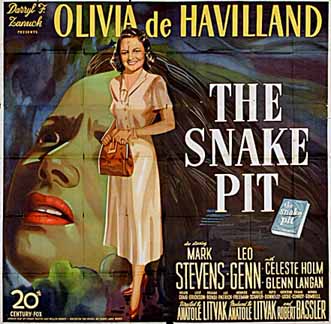
THE SNAKE PIT
US, 1948, 108 minutes, Black and White.
Olivia De Havilland, Mark Stevens, Leo Genn, Celeste Holm.
Directed by Anatole Litvak
The Snake Pit was a very striking film for 1948, life in a mental institution before the 40s. The film is based on a story by Mary Jane Ward and the Olivia de Havilland character is based on Miss Ward’s own experience. She finds herself in an institution, her husband talks and the flashbacks present her story. She is under the care of Doctor Kik, based on the career of Doctor Gerard Chrzanowski (died in 2000).
Olivia de Havilland had won an Oscar for To Each His Own and was to win another one the next year for The Heiress. A leading lady in dramas and adventures in the 1930s, she showed her dramatic strength in the films of the 1940s. There is very good support from Leo Genn as Doctor Kick and Betsy Blair as one of the inmates.
Ukraine-born director Anatole Litvak had begun his career in Germany, coming to the United States and directing such films as The Sisters, Confessions of a Nazi Spy. In the 1940s he directed The Long Night as well as Sorry, Wrong Number. Later he was to direct The Deep Blue Sea and Ingrid Bergman in her Oscar-winning performance in Anastasia.
1. The overtones of the title - the horror, yet its shock therapy value for Virginia?
2. Overall impression of the film? How engrossing? How horrifying? How did the film bear the mark of 1948? In style, in psychological techniques? In being didactic about its subject? In its reforming plea for asylums? What impact does it have in later decades?
3. How successful was the structure of the film? The introduction to the mad Virginia? With her hallucinations and voices? An emotional response to this and then flashbacks to the sane Virginia and the contrast and sympathies for the real Virginia? Was it cumbersome or was it convincing?
4. What importance did the flashbacks have as regards our sharing Virginia's outlook? Her groping for the truth about herself? Her growth in under- standing? Our growth in understanding her?
5. What impression did the asylum make? How horrifying and why? The nature of the treatment of the patients? The inhumanity of the wards? The rough treatment of the personnel? The dormitories and the screaming etc.? The nature of the shock treatment? The straight jackets and the varying cells and grades of treatment? How have treatments changed in institutions?
6. How much kindness was there in the film? How could the patients respond to kindness? How did they grow through the kindness? Dr Kick? How kind was he? His use of shock treatment, his use of therapy by listening? Critics have commented that this was phoney psychology. Do you agree? How did Virginia fall in love with Dr. Kick? Did this matter? When she was cured how did she see this? The effect of kindness of other patients eg. Virginia kindness to Hester, in the ward, at the dance, when she was leaving?
7. What impact did the asylum have on Virginia? At the beginning? Her line-up going to the doctor, to meals etc. her rebellion? Was this intended to cure her or did it make her situation worse? When did she begin to regain her sanity? When did her voices stop?
8. What was the immediate cause of Virginia’s break-down? The revelation in the flashbacks about her meeting with Robert? (How did we see Virginia from Robert's point of view and understand her?) The erratic behaviour, her love for Robert, her fear of loving him? Why did this have such strong impact and make her break?
9. Was the explanation of Virginia's potential for breakdown quite credible? The flashbacks to Virginia as a girl? To her father and his reprimanding her? To Gordon and his proposal? Her feelings of responsibility for deaths? Her inability to give herself in love? How convincing was this?
10. How did Virginia gradually feel a sense of liberation from her past? The importance of her interview with the staff? How horrifying was this? Why? How was the severe nurse responsible for Virginia’s further collapse? The incident with the doll? Her going back to the lowest ward etc.?
11. What effect did this have on Robert? The nature of his devotion? His pressurising to get her out? The misinformed value of this? His gradual change to help her?
12. Comment on the sequence which visualised the title of the film. What impact did it have on you? On her?
13. How much hope was there in the film? Was it a realistic presentation of an ever present reality of madness in the world?
14. How have things changed from 1948?